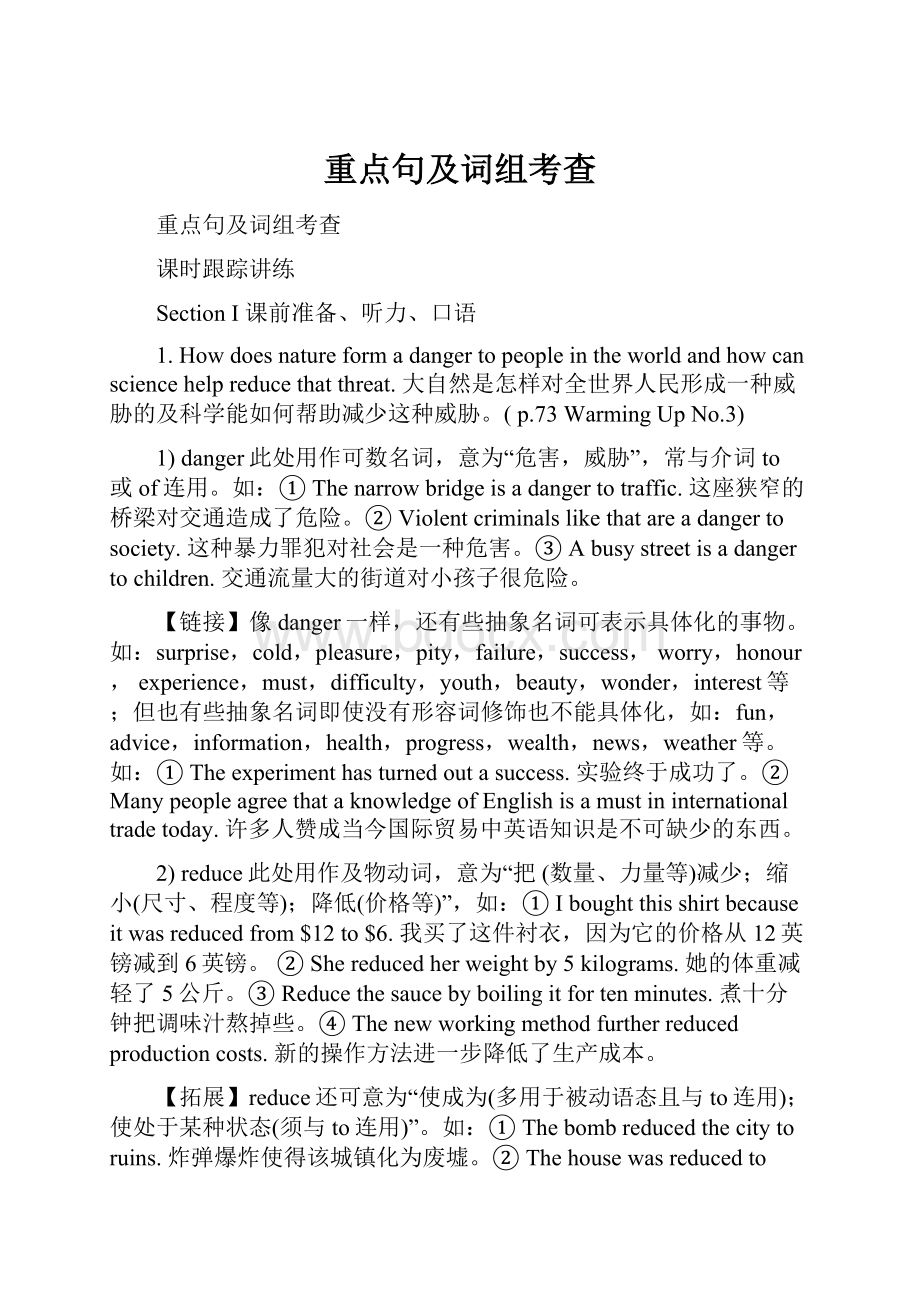 重点句及词组考查.docx
重点句及词组考查.docx
- 文档编号:9437740
- 上传时间:2023-02-04
- 格式:DOCX
- 页数:24
- 大小:45.80KB
重点句及词组考查.docx
《重点句及词组考查.docx》由会员分享,可在线阅读,更多相关《重点句及词组考查.docx(24页珍藏版)》请在冰豆网上搜索。

重点句及词组考查
重点句及词组考查
课时跟踪讲练
SectionI课前准备、听力、口语
1.Howdoesnatureformadangertopeopleintheworldandhowcansciencehelpreducethatthreat.大自然是怎样对全世界人民形成一种威胁的及科学能如何帮助减少这种威胁。
(p.73WarmingUpNo.3)
1)danger此处用作可数名词,意为“危害,威胁”,常与介词to或of连用。
如:
①Thenarrowbridgeisadangertotraffic.这座狭窄的桥梁对交通造成了危险。
②Violentcriminalslikethatareadangertosociety.这种暴力罪犯对社会是一种危害。
③Abusystreetisadangertochildren.交通流量大的街道对小孩子很危险。
【链接】像danger一样,还有些抽象名词可表示具体化的事物。
如:
surprise,cold,pleasure,pity,failure,success,worry,honour,experience,must,difficulty,youth,beauty,wonder,interest等;但也有些抽象名词即使没有形容词修饰也不能具体化,如:
fun,advice,information,health,progress,wealth,news,weather等。
如:
①Theexperimenthasturnedoutasuccess.实验终于成功了。
②ManypeopleagreethataknowledgeofEnglishisamustininternationaltradetoday.许多人赞成当今国际贸易中英语知识是不可缺少的东西。
2)reduce此处用作及物动词,意为“把(数量、力量等)减少;缩小(尺寸、程度等);降低(价格等)”,如:
①Iboughtthisshirtbecauseitwasreducedfrom$12to$6.我买了这件衬衣,因为它的价格从12英镑减到6英镑。
②Shereducedherweightby5kilograms.她的体重减轻了5公斤。
③Reducethesaucebyboilingitfortenminutes.煮十分钟把调味汁熬掉些。
④Thenewworkingmethodfurtherreducedproductioncosts.新的操作方法进一步降低了生产成本。
【拓展】reduce还可意为“使成为(多用于被动语态且与to连用);使处于某种状态(须与to连用)”。
如:
①Thebombreducedthecitytoruins.炸弹爆炸使得该城镇化为废墟。
②Thehousewasreducedtoashes.房子被烧成了灰烬。
③Hemanagedtoreducedthegroupofchildrentosilence.他设法使这些孩子静了下来。
④Intheoldsocietyhewasreducedtobegging.在旧社会他被逼得讨饭。
2.Myfriendsaidhewasscaredtodeath.我的朋友说他吓得要死。
(p.74Speaking倒数第7行)
1)scared意为“感到害怕(恐惧)的,受惊吓的”,其后常与介词of/at,动词不定式或that从句连用。
如:
①Areyouscaredofsnakes?
你怕蛇吗?
②Whywon'tyoucomeonthetrip?
Areyouscared?
你为什么不参加旅行?
你害怕吗?
③Shewasscaredtorideonthehorse.她怕
骑马。
④I'mscaredtoflyinaplane/scaredthatitmightcrash.我很怕坐飞机旅行/很怕飞机坠毁。
【辨析】scared;frightened;terrified三者意义相同,只是程度不同:
scared语气最弱,terrified语气最强。
①Ifeltabitscaredwhentheplanetookoff.飞机起飞时,我有点害怕。
②Thechildwasfrightenedbythebigdog.那孩子被狗吓坏了。
③Iwasterrifiedwhenthetigerrantowardsme.那只老虎向我扑来时,我吓坏了。
2)本句中的介词to表示某一过程达到的结果,变为“成了…,以至变为…”。
如:
①Hisdebtsamountedto5,000dollars.他的负债额达到了5000美元。
②Thecupwasbrokentopieces.那杯子破成了碎片。
③Thesnowsoonturnedtowaterundertheraysofthesun.在阳光照射下雪很快变成了水。
④ThecakewasburnttoacinderbythetimeMarygotback.玛丽回来时,点心已烤成焦炭。
⑤Hedrankhimselftodeath.他饮酒致死。
⑥Toourgreatsurprise,hedidn'tturnup.使我们很奇怪的是他竟然没有露面。
3.Somepeoplegotintoatotalpanic,whenthetyphoonpulledtheroofsofftheirhousesandcarswentupintheair.当台风掀掉屋顶、汽车刮上天时,有些人惊慌起来。
(p.74Speaking倒数第4行)
1)getintoapanic意为“进入恐怖状态”,其后与about连用引出原因。
如:
①Theaudiencegotintoapanicaboutthefireinthetheatre.观众因剧院起火而变得慌乱起来。
②Shegotintoapanicwhenshethoughtshe'dforgottenthetickets.她想起忘了带入场券时,顿时惊慌起来。
【注意】panic尤其指没有明确的理由而传开于群众间的恐慌,通常用单数形式或当作不可数名词。
如:
①Wewerethrownintoapanicwhenthelightssuddenlywentoff.当灯突然熄灭时,我们陷入一片慌乱。
②Thecrowdwasinapanic.群众陷入恐慌状态。
2)句中off意为“从原位置或接触连接处移开,分离或脱落”,即从整体中去掉某一部分。
如:
①Oneofthebuttonshascomeoffmycoat.我的衣服掉了一个纽扣。
②Thebushitatruckandranofftheroad.那辆公共汽车撞上了一辆卡车,冲出了公路。
③Shetooksomemeatofftheplate.她从盘子里拿走了一些肉。
④Youaregoingoffthesubject,aren'tyou?
你的话离题了,不是吗?
3)goup的几种常见意思:
a.上涨,提高;b.响起;c.爆炸,被炸,/烧毁;d.拔地而起。
如:
①Everythingseemstobegoingupthesedays.近来什么东西好像都要涨价。
②Whenthefirststreamofclearwaterflowedintothecanal,agreatcheerwentup.当第一股清泉流入水渠时,顿时一片欢腾。
③Thetallbuildingwentupinflames.这座大楼在熊熊烈火中烧毁了。
④Newuniversitieswentupatafantasticrateinthe1980s.在80年代,新的大学以极快的速度建造起来。
4.Yeah,man.Nowthatkindofthingwouldreallyfrightenme.嗯,老兄。
那种事情确实使我害怕。
(p.74Speaking倒数第4行)
man此处用作不可数名词,用于称呼男性,意为“老兄”。
如:
①Thispartyisreallygreat,man!
老兄,这个聚会真是棒极了!
②Wakeup,man,youcan'tsleepallday!
老兄,醒醒,你不能整天睡觉!
【链接】有关man的几种特殊用法:
(1)在男人与女人相提并论时,man前不用冠词,单独用。
如:
Manisstrongerthanwoman.男人比女人强壮。
(2)用作不可数名词,表示“人类”时,不和冠词连用。
如:
Manmustfightforhisownexistence.人类必须为自己的生存而奋斗。
(3)menandwoman是固定短语,词序不能颠倒,表示“男女”。
如:
ThisTVplayissointerestingthatmenandwomen,boysandgirlsliketowatchit.这部电视剧非常有趣,男女老少都爱看。
(4)含man的几条谚语:
①Somanymen,somanyminds.人各有志。
②Likemaster,likeman.有其主必有其仆。
③Deadmantellnotales.死人不会泄露。
④Amancandiebutonce.人无二死。
⑤Amancandon0morethanhecan.凡事应量力而行。
⑥Amancannotspinandreelatthesametime.一心不能二用。
⑦Amanhaschoicetobeginlove,butnottoendit.谈爱容易摆脱难。
⑧Menmaymeetbutmountainsnever.人生何处不相逢。
⑨Amanofwordsandnotofdeedsislikeagardenfullofweeds.光说不做的人有如光生长野草的花园。
⑩Nomanisbornwiseorlearned.人非生而知之者。
⑪Nomaniswiseatalltimes.智者千虑必有一失。
5.Itmakesmyhairstandonend.这令我毛骨悚然。
(p.75Usefulexpressions)
onend意义有二:
a.直立;b.连续的,继续地(也可以说right/straightonend)。
如:
Wehadtostandthetableonendtogetinthroughthedoor.我们只能把桌子竖起才能把它抬进这门。
Theterriblesightmadeherhairstandonend.那可怕的景象使她毛骨悚然。
Hesatthereforhoursonend.她连续几个小时坐在那儿。
Ithasbeensnowingonendforaweek.雪连续下了一周。
SectionII阅读
6.YouaskedmetowriteyousomethingaboutthedeathofmyunclePliny,whodiedinanunforgettabledisaster.你叫我写信告诉你有关我叔叔普利尼死亡的一些情况,他是在一次难忘的灾难中去世的。
(p.76Reading第一段第2行)
disaster意为“灾难;惨事;灾害;不幸”,可用作可数名词,也可用作不可数名词,它主要表示突然降临的使个人生命财产受到损失或毁掉某人事业、前途的灾难,也指自然灾害。
如:
①Thefloodwasaterribledisaster,hundredsofpeopledied.那次洪水是一场可怕的灾难,有数以百计的人丧生。
②Everythingwasgoingwell,andthensuddenlydisasterstruck.一切正进展顺利的时候,突然发生了可怕的事情。
③Theelectionresultswillbringpoliticaldisaster.这次选举的结果会在政治上引起严重的不良后果。
④Thecrashwastheworstairdisasterthisyear.那次飞机坠毁事件是今年最严重的空难。
【拓展】惹祸:
cause/court/invitedisaster
遭受灾害:
experience/meet/suffer(a)disaster
7.WelivedinsouthernItaly.我们居住在意大利南部。
(p.76Reading第二段第1行)
south,southern,southward(s);southerly(这类词汇)
(1)为明确地给地球表面划定范围,尤其是政治范围时,我们通常用south,north,east;west;对于不太明确的范围划分,通常用southern,northern,eastern,western。
如:
SouthAfrica南非SouthernAfrica南部非洲(包括南部非洲许多地方,不光指南非)EastChina华东theeasternpartofChina中国的东部(不光指华东地区)
(2)south等词,重点在形容方位或从哪个方向来的;而southern等词则指从某一固定地点看某一方向,或指某物来自何方向或某个方向。
如:
theNorthPole北极theWesternHills西山(指从北京看,西山在西方)
(3)south等作副词时,和southward(s)等意义相同,但后者较少使用;southward(adj.&adv.)等词比south(adj.&adv.)等“朝、向”概念更强。
如:
①Ourhousefacessouth/southward.我们家的房子朝南。
②Afterhavingtravelled15miles,weturnedeastwards.我们走了15英里后就转往东去了。
③Theyadvancedinawestwarddirection.他们朝西方行进。
(4)southerly等词用于表示气流和风向,意为“来自某方向”(主要指“偏南”等)。
如:
Thesoutherlyairstreamwillbringrain.南来的气流会带来雨水。
【注意】方位名词south,north,east,west等常与定冠词连用。
如:
①Theairportisafewkilometrestothe
southofLondon.机场位于伦敦以南几公里处。
②Thecloudsarecomingfromthewest.那些云自西边涌起。
8.Onthe24thofAugustin79AD,betweentwoandthreeintheafternoonmymotherdrewmyuncle'sattentiontoacloudofunusualsizeandshape.在公元79年8月24日那天,下午两三点时分我妈妈让我叔叔注意到了一片不同寻常大小和形状的云。
(p.76Reading第二段第2行)
1)drawone'sattention:
“引起某人注意”我们可说:
attract/capture/catch/command/draw/get/bringtoone'sattention。
如:
①Hershoutsdrewtheattentionofthepolice.她的喊叫声引起了警察的注意。
②Hedrewatten-tiontotherisingunemployment.(=Therisingunemploy-mentdrewhisattention.)失业率的日渐升高引起了他的注意。
③Idrewhisattentiontothefact.我使他注意此事。
④Thematterattractedourattention.那件事引起了我们的注意。
⑤Shewavedherhandtocatchmyattention.她挥手以引起我的注意。
【链接】与attention构成的常见搭配:
devoteone'sattentionto专心于;give/payattentionto注意;holdone'sattentionon将注意力集中在;direct/turnone'sattentionto将注意力转向;fixone'sattentionon留意,专心于;withattention专心,注意地;standatattention立正;Attention,please!
请各位注意!
【注意】payone'sattentionto还意为“向女人献殷勤”。
【拓展】attention除作“注意”讲,还可意为“照料;治疗;亲切;殷勤”。
如:
①Theboyshowshismothermuchattention.这男孩非常关心他母亲。
②Thepatientneedsimmediateattention.那病人需要立即治疗。
③Hetriedtowinherheartbyalotofattention.他向她献殷勤以获芳心。
2)beofa(n)/the/thesame+表示年龄、形状、大小、样式、种类等名词,可在句中作定语或表语,说明名词的特征或性质。
如:
①Thetwoboysareofmiddleheight.这个男孩中等个子。
②Birdsofafeatherflocktogether.物以类聚。
③Theyareofthesameage.他们年龄一样大。
④Thetworoomsareofasize.这两个房间一样大小。
8.Wewatcheditrisingfromamountain—atsuchadistancewecouldn'ttellwhichone,butwelaterlearntthatitwasMountVesuvius.我们看见它是从一座山上升起来的-在这么远的地方我们分辨不出是哪座山,但后来我们得知那是维苏威火山。
(p.76Reading第二段第3行)
1)atadistance意为“从远处;隔开一段距离”。
如:
①Dogsthatbarkatadistanceneverbite.在远处叫的狗不咬人。
②Thesoundofthewaterfallcanbeheardatadistanceof2miles.在2英里外就能听到瀑布声。
③Thepyramidsarevisibleatadistanceofseveralkilometres.一座座金字塔在数英里的地方就能看到。
④Whileshewasyetatsomedistance,heturnedandsawher.她在远处还有一段距离时,他转身看到了她。
⑤Shekepthimatadistanceuntilhehadprovedhecouldbetrusted.在他证明自己确实可依赖之前,她一直对他很冷淡。
【链接】与distance构成的短语:
fromadistance从远处inthedistance在远处,远方的;keepone'sdistance保持距离;不亲近;keepsb.atadistance冷待某人;gothefulldistance走完全程;workoutdistance计算出距离;bydistance按里程;withinhearingdistance在能听到的地方
2)tell此处意为“断定;辨别;识别;看出”,通常用于否定句和疑问句,与can,could或beableto连用。
如:
①Thetwobrothersaresomuchalikethatitisalmostimpossibletotellonefromtheother.这两兄弟非常相像,几乎不可能把他们分辨出来。
②Ican'ttellwhichbagishers.我分辨不出哪一个手提袋是她的。
③Canyoutellthedifferencebetweenthetwo?
你能看出两者之间的差别吗?
④Noonecantellwhatwillhappeninthefuture.谁也不知道将来会发生什么。
⑤Ican'ttellwhether/ifit'sright.我不能判定此事是对还是错。
9.Thesightofitawokethescientistinmyuncletogoandseeitfromcloserathand.目睹到这情景,身为科学家的我叔叔决定到近处观察。
(p.76Reading第二段第5行)
1)介词in在此表示同一性,意为“在……(身)上”。
如:
①Andyouwillhaveanothersupporterinme.你还有另一个支持者,那就是我。
②InherIseeafutureleader.我看出她是一位未来的领袖人物。
③Youwillalwayshaveafriendinme.我将永远是你的一位好朋友。
④Shedidn'thaveitinhertocheat.她不会做骗人的事情。
2)athand此处意为“在近处”,为固定搭配。
如:
①For-tunatelytherewassomeoneathand,soweaskedhimtodeliverthemessageatonce.幸好附近有人,因此我们就请他立即把信送去。
②Theylivecloseathand.他们住在附近。
【拓展】athand还可作“即将来到,在手边”讲。
如:
①Ialwayskeepadictionary(ready)athand.我总是把词典放在手边。
②Ihaven'tmybookathand
- 配套讲稿:
如PPT文件的首页显示word图标,表示该PPT已包含配套word讲稿。双击word图标可打开word文档。
- 特殊限制:
部分文档作品中含有的国旗、国徽等图片,仅作为作品整体效果示例展示,禁止商用。设计者仅对作品中独创性部分享有著作权。
- 关 键 词:
- 重点 词组 考查
 冰豆网所有资源均是用户自行上传分享,仅供网友学习交流,未经上传用户书面授权,请勿作他用。
冰豆网所有资源均是用户自行上传分享,仅供网友学习交流,未经上传用户书面授权,请勿作他用。


 《城市规划基本知识》深刻复习要点.docx
《城市规划基本知识》深刻复习要点.docx
